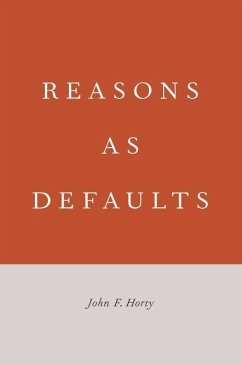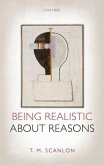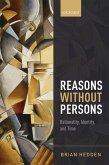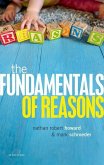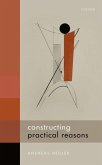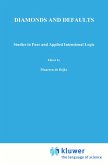John Francis Horty
Reasons as Defaults
John Francis Horty
Reasons as Defaults
- Broschiertes Buch
- Merkliste
- Auf die Merkliste
- Bewerten Bewerten
- Teilen
- Produkt teilen
- Produkterinnerung
- Produkterinnerung
In this volume, John Horty brings to bear his work in logic to present a framework that allows for answers to key questions about reasons and reasoning, namely: What are reasons, and how do they support actions or conclusions?
Andere Kunden interessierten sich auch für
![Being Realistic about Reasons Being Realistic about Reasons]() T M ScanlonBeing Realistic about Reasons57,99 €
T M ScanlonBeing Realistic about Reasons57,99 €![Reasons Without Persons Reasons Without Persons]() Brian HeddenReasons Without Persons99,99 €
Brian HeddenReasons Without Persons99,99 €![Weighing Reasons Weighing Reasons]() Weighing Reasons120,99 €
Weighing Reasons120,99 €![The Fundamentals of Reasons The Fundamentals of Reasons]() Mark SchroederThe Fundamentals of Reasons110,99 €
Mark SchroederThe Fundamentals of Reasons110,99 €![Kinds of Reasons Kinds of Reasons]() Maria AlvarezKinds of Reasons125,99 €
Maria AlvarezKinds of Reasons125,99 €![Constructing Practical Reasons Constructing Practical Reasons]() Andreas MüllerConstructing Practical Reasons98,99 €
Andreas MüllerConstructing Practical Reasons98,99 €![Diamonds and Defaults Diamonds and Defaults]() Diamonds and Defaults115,99 €
Diamonds and Defaults115,99 €-
-
-
In this volume, John Horty brings to bear his work in logic to present a framework that allows for answers to key questions about reasons and reasoning, namely: What are reasons, and how do they support actions or conclusions?
Hinweis: Dieser Artikel kann nur an eine deutsche Lieferadresse ausgeliefert werden.
Hinweis: Dieser Artikel kann nur an eine deutsche Lieferadresse ausgeliefert werden.
Produktdetails
- Produktdetails
- Verlag: Oxford University Press
- Seitenzahl: 276
- Erscheinungstermin: 1. August 2014
- Englisch
- Abmessung: 234mm x 156mm x 16mm
- Gewicht: 474g
- ISBN-13: 9780199396443
- ISBN-10: 0199396442
- Artikelnr.: 47866645
- Herstellerkennzeichnung
- Libri GmbH
- Europaallee 1
- 36244 Bad Hersfeld
- gpsr@libri.de
- Verlag: Oxford University Press
- Seitenzahl: 276
- Erscheinungstermin: 1. August 2014
- Englisch
- Abmessung: 234mm x 156mm x 16mm
- Gewicht: 474g
- ISBN-13: 9780199396443
- ISBN-10: 0199396442
- Artikelnr.: 47866645
- Herstellerkennzeichnung
- Libri GmbH
- Europaallee 1
- 36244 Bad Hersfeld
- gpsr@libri.de
John Horty is Professor of Philosophy, University of Maryland. He is the author of Agency and Deontic Logic and Frege on Definitions.
Introduction
I Default logic
1 A Primer on Default Logic
1.1 Basic concepts
1.1.1 Default rules
1.1.2 Priority relations
1.1.3 Theories and scenarios
1.2 Central definitions
1.2.1 Binding defaults
1.2.2 Proper scenarios and extensions
1.3 Extensions and conclusions
1.3.1 Theories with multiple extensions
1.3.2 Theories without extensions
2 From Defaults to Reasons
2.1 An austere theory of reasons
2.2 Developing the theory
2.2.1 Conflict, strength, and defeat
2.2.2 Reasons and enablers
2.2.3 Reason amalgamation
II Deontic Logic
3 Reasons and Oughts
3.1 The two logics
3.1.1 Simple oughts
3.1.2 Conditional oughts
3.1.3 Some history
3.2 Properties of the logics
4 Moral Conflicts
4.1 Logical objections
4.1.1 Agglomeration
4.1.2 Other logical objections
4.2 Conceptual objections
4.3 Objections based on reasons as moral forces
III Some Elaborations
5 Variable Priorities and Exclusion
5.1 Variable priority default theories
5.1.1 The definition
5.1.2 Some examples
5.2 Exclusionary default theories
5.2.1 The definition
5.2.2 Some examples
5.3 Discussion
5.3.1 Downward closure of exclusion
5.3.2 Exclusion by weaker defaults
5.3.3 Excluders, intensifiers, and attenuators
6 Particularism
6.1 Dancy's argument
6.2 Evaluating the argument
6.3 Discussion
6.3.1 Pragmatic considerations
6.3.2 Borrowing a book
6.3.3 Moderate particularism
IV Some complications
7 Skepticism and Floating Conclusions
7.1 Floating conclusions
7.1.1 Arguments and paths
7.1.2 Two versions of skepticism
7.2 The problem with floating conclusions
7.2.1 An example
7.2.2 Objections to the example
7.3 Discussion
7.3.1 Other examples
7.3.2 Skepticism
8 Problems with Priorities
8.1 Refining the concept of defeat
8.2 Controlling the order of application
8.3 Discussion
8.3.1 Inappropriate equilibria
8.3.2 Other orderings
8.3.3 Reinstatement
V Appendices
A Notes on the default logics
A.1 Proper scenarios
A.2 Some observations on defeat
A.3 Normal default theories
B Notes on the deontic logics
B.1 A comparison with van Fraassen's logic
B.2 A comparison with standard deontic logic
I Default logic
1 A Primer on Default Logic
1.1 Basic concepts
1.1.1 Default rules
1.1.2 Priority relations
1.1.3 Theories and scenarios
1.2 Central definitions
1.2.1 Binding defaults
1.2.2 Proper scenarios and extensions
1.3 Extensions and conclusions
1.3.1 Theories with multiple extensions
1.3.2 Theories without extensions
2 From Defaults to Reasons
2.1 An austere theory of reasons
2.2 Developing the theory
2.2.1 Conflict, strength, and defeat
2.2.2 Reasons and enablers
2.2.3 Reason amalgamation
II Deontic Logic
3 Reasons and Oughts
3.1 The two logics
3.1.1 Simple oughts
3.1.2 Conditional oughts
3.1.3 Some history
3.2 Properties of the logics
4 Moral Conflicts
4.1 Logical objections
4.1.1 Agglomeration
4.1.2 Other logical objections
4.2 Conceptual objections
4.3 Objections based on reasons as moral forces
III Some Elaborations
5 Variable Priorities and Exclusion
5.1 Variable priority default theories
5.1.1 The definition
5.1.2 Some examples
5.2 Exclusionary default theories
5.2.1 The definition
5.2.2 Some examples
5.3 Discussion
5.3.1 Downward closure of exclusion
5.3.2 Exclusion by weaker defaults
5.3.3 Excluders, intensifiers, and attenuators
6 Particularism
6.1 Dancy's argument
6.2 Evaluating the argument
6.3 Discussion
6.3.1 Pragmatic considerations
6.3.2 Borrowing a book
6.3.3 Moderate particularism
IV Some complications
7 Skepticism and Floating Conclusions
7.1 Floating conclusions
7.1.1 Arguments and paths
7.1.2 Two versions of skepticism
7.2 The problem with floating conclusions
7.2.1 An example
7.2.2 Objections to the example
7.3 Discussion
7.3.1 Other examples
7.3.2 Skepticism
8 Problems with Priorities
8.1 Refining the concept of defeat
8.2 Controlling the order of application
8.3 Discussion
8.3.1 Inappropriate equilibria
8.3.2 Other orderings
8.3.3 Reinstatement
V Appendices
A Notes on the default logics
A.1 Proper scenarios
A.2 Some observations on defeat
A.3 Normal default theories
B Notes on the deontic logics
B.1 A comparison with van Fraassen's logic
B.2 A comparison with standard deontic logic
Introduction
I Default logic
1 A Primer on Default Logic
1.1 Basic concepts
1.1.1 Default rules
1.1.2 Priority relations
1.1.3 Theories and scenarios
1.2 Central definitions
1.2.1 Binding defaults
1.2.2 Proper scenarios and extensions
1.3 Extensions and conclusions
1.3.1 Theories with multiple extensions
1.3.2 Theories without extensions
2 From Defaults to Reasons
2.1 An austere theory of reasons
2.2 Developing the theory
2.2.1 Conflict, strength, and defeat
2.2.2 Reasons and enablers
2.2.3 Reason amalgamation
II Deontic Logic
3 Reasons and Oughts
3.1 The two logics
3.1.1 Simple oughts
3.1.2 Conditional oughts
3.1.3 Some history
3.2 Properties of the logics
4 Moral Conflicts
4.1 Logical objections
4.1.1 Agglomeration
4.1.2 Other logical objections
4.2 Conceptual objections
4.3 Objections based on reasons as moral forces
III Some Elaborations
5 Variable Priorities and Exclusion
5.1 Variable priority default theories
5.1.1 The definition
5.1.2 Some examples
5.2 Exclusionary default theories
5.2.1 The definition
5.2.2 Some examples
5.3 Discussion
5.3.1 Downward closure of exclusion
5.3.2 Exclusion by weaker defaults
5.3.3 Excluders, intensifiers, and attenuators
6 Particularism
6.1 Dancy's argument
6.2 Evaluating the argument
6.3 Discussion
6.3.1 Pragmatic considerations
6.3.2 Borrowing a book
6.3.3 Moderate particularism
IV Some complications
7 Skepticism and Floating Conclusions
7.1 Floating conclusions
7.1.1 Arguments and paths
7.1.2 Two versions of skepticism
7.2 The problem with floating conclusions
7.2.1 An example
7.2.2 Objections to the example
7.3 Discussion
7.3.1 Other examples
7.3.2 Skepticism
8 Problems with Priorities
8.1 Refining the concept of defeat
8.2 Controlling the order of application
8.3 Discussion
8.3.1 Inappropriate equilibria
8.3.2 Other orderings
8.3.3 Reinstatement
V Appendices
A Notes on the default logics
A.1 Proper scenarios
A.2 Some observations on defeat
A.3 Normal default theories
B Notes on the deontic logics
B.1 A comparison with van Fraassen's logic
B.2 A comparison with standard deontic logic
I Default logic
1 A Primer on Default Logic
1.1 Basic concepts
1.1.1 Default rules
1.1.2 Priority relations
1.1.3 Theories and scenarios
1.2 Central definitions
1.2.1 Binding defaults
1.2.2 Proper scenarios and extensions
1.3 Extensions and conclusions
1.3.1 Theories with multiple extensions
1.3.2 Theories without extensions
2 From Defaults to Reasons
2.1 An austere theory of reasons
2.2 Developing the theory
2.2.1 Conflict, strength, and defeat
2.2.2 Reasons and enablers
2.2.3 Reason amalgamation
II Deontic Logic
3 Reasons and Oughts
3.1 The two logics
3.1.1 Simple oughts
3.1.2 Conditional oughts
3.1.3 Some history
3.2 Properties of the logics
4 Moral Conflicts
4.1 Logical objections
4.1.1 Agglomeration
4.1.2 Other logical objections
4.2 Conceptual objections
4.3 Objections based on reasons as moral forces
III Some Elaborations
5 Variable Priorities and Exclusion
5.1 Variable priority default theories
5.1.1 The definition
5.1.2 Some examples
5.2 Exclusionary default theories
5.2.1 The definition
5.2.2 Some examples
5.3 Discussion
5.3.1 Downward closure of exclusion
5.3.2 Exclusion by weaker defaults
5.3.3 Excluders, intensifiers, and attenuators
6 Particularism
6.1 Dancy's argument
6.2 Evaluating the argument
6.3 Discussion
6.3.1 Pragmatic considerations
6.3.2 Borrowing a book
6.3.3 Moderate particularism
IV Some complications
7 Skepticism and Floating Conclusions
7.1 Floating conclusions
7.1.1 Arguments and paths
7.1.2 Two versions of skepticism
7.2 The problem with floating conclusions
7.2.1 An example
7.2.2 Objections to the example
7.3 Discussion
7.3.1 Other examples
7.3.2 Skepticism
8 Problems with Priorities
8.1 Refining the concept of defeat
8.2 Controlling the order of application
8.3 Discussion
8.3.1 Inappropriate equilibria
8.3.2 Other orderings
8.3.3 Reinstatement
V Appendices
A Notes on the default logics
A.1 Proper scenarios
A.2 Some observations on defeat
A.3 Normal default theories
B Notes on the deontic logics
B.1 A comparison with van Fraassen's logic
B.2 A comparison with standard deontic logic

